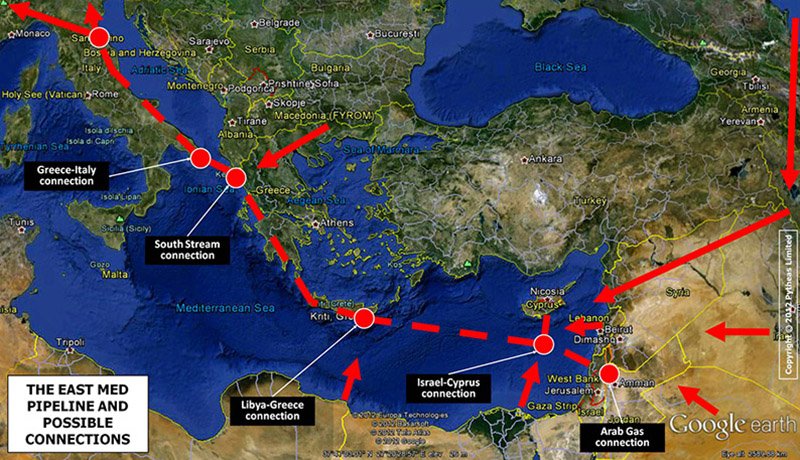Turkey’s president Tayyip Erdogan announced on Thursday that Israeli president Isaac Herzog will pay an official visit to Ankara next month. While Herzog’s spokesman declined to comment, The Times of Israel reported that officials confirmed there were talks about a visit, indicating that it was on but some of the details had yet to be finalised.
A week before this announcement, shortly after the United States officially pulled the plug on the EastMed pipeline, Erdogan said that he was resurrecting talks with Israel on bringing gas from the Eastern Mediterranean to European countries through Turkey. “We are now holding talks with President Herzog,” said Erdogan, also pointing out that “Prime minister Naftali Bennett also has a positive approach.”
Turkey has been working for some time to mend relations with Israel, which had been strained since the Mavi Marmara incident in 2010, which led to the death of nine Turkish activists after Israeli troops boarded a flotilla carrying humanitarian aid to Gaza. Attempts at improving relations suffered another setback in May 2018 after the killing of tens of Palestinians along the Gaza border led to both countries withdrawing their ambassadors.
Relations have been improving in the last year. A year ago, El Al resumed flights to Istanbul International Airport after 10 years of staying away, while there are contacts between the countries at the highest level. In November Erdogan and Herzog spoke on the phone and during the call the Turkish president said relations with Israel were of “key importance to the peace, stability and security of the Middle East.”
Many reasons have contributed to Erdogan’s efforts to improve relations with Israel – the election of Joe Biden who has a different agenda from his predecessor, the change of government in Israel, the recent normalisation of relations between Israel and four Muslim countries and most recently the withdrawal of US support for the EastMed pipeline, which Turkey saw as an attempt to exclude it from the energy wealth of the Eastern Mediterranean.
Where does this leave Cyprus, which had invested so much in its energy alliance with Israel, based on a project that was unviable and primarily existed on paper and in high-sounding rhetoric than on anything tangible? This so-called alliance, which the government and its now departed foreign minister repeatedly declared had upgraded the geo-strategic role of Cyprus in the region, was an abstract construct.
Cyprus and Israel could not even agree to develop a pipeline jointly to take gas from the neighbouring gas fields of Leviathan and Aphrodite to the liquefaction plant in Egypt, although both had signed agreements with Egypt and both fields were licensed to the same companies at the time. Could this have been because Israel did not want any trouble with Turkey which was and remains at loggerheads with Cyprus over hydrocarbons?
It is perfectly understandable that Israel did not want to put its energy plans at risk for the sake of Cyprus but had President Anastasiades, his strategic council and his foreign minister at the time who reveled in talking up the significance of the Republic’s energy alliances, not identified this possibility? All they seemed to care about was winning cheap political points by selling this alliance (as well as that with Egypt from which Cyprus gained next to nothing) and a fantasy project to the public, oblivious to the fact that the show could not last forever.
We may have our trilateral alliances but on energy Cyprus is isolated. Although no decision has yet been taken, Israel could soon agree to export gas to European customers via Turkey, while Greece is discussing having gas supplied by pipeline from Leviathan via Egypt. The harsh reality is that neither Greece nor Israel wants a confrontation with Turkey over Cyprus’ gas and they are each pursuing their own plans having left Cyprus on its own without knowing if it will ever find buyers for its gas.
The country’s energy policy is a fiasco because it has always been treated by Anastasiades and Nicos Christodoulides as a publicity game and nothing more. They used their alliances to claim they had sidelined Turkey and neutralised threats, but in the end, they were exposed for their naivety and complete lack of political pragmatism. It was not as if nobody saw this coming. Disy leader Averof Neophytou had warned on countless occasions that without a Cyprus settlement we would not extract a gram of gas from our EEZ. Was he the only one seeing the writing on the wall?
This was a pragmatic evaluation of our predicament. The big question is what happens now that we have run out of options? The US could revive the energy plans it had for the Mediterranean before Donald Trump became president. That it withdrew its support for the EastMed pipeline because it caused tension in the region is a sign supporting this as was the re-appointment a few months ago of Amos Hochstein as Senior Advisor of Global Energy Security at the State Department. Hochstein had worked on Eastern Mediterranean energy security during the Barrack Obama presidency.
Whether we like it or not Cyprus’ energy plans are at a dead end. When they are re-drafted, we hope the government introduces pragmatism to the exercise, realises it has to reach some kind of arrangement with Turkey and puts aside the publicity games.







Click here to change your cookie preferences